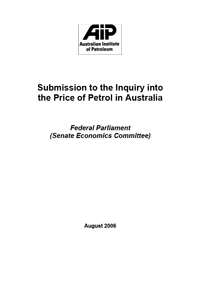Australian consumers continue to benefit from a competitive petrol market and retail price cycles
The Australian Institute of Petroleum (AIP) recently lodged a comprehensive submission to the Senate Committee Inquiry into the price of petrol in Australia. This submission has been prepared to improve community understanding about petrol pricing in Australia and the international and domestic factors impacting on the level of petrol prices and on their movement over time.
The Executive Director of the AIP, Dr John Tilley, said “Australian consumers have benefited from retail price cycles - which are a sign of aggressive retail discounting rather than price collusion”.
"As confirmed by ACCC analysis since 2001, and recent AIP analysis, these discount cycles have favoured the consumer, with over 60% of petrol sales below the average price of the price cycle. The benefits from this competition would be lost to consumers if fuel prices were regulated”, Dr Tilley said.
The Caltex Australia Limited submission to the Senate Petrol Pricing Inquiry analyses the source of this retail competition. The Caltex analysis shows that in each State the major retailers and a couple of the larger independent chains are responsible for the majority of aggressive discounting in different areas. The discount leaders vary between local retail markets.
“The supermarket alliances now handle a significant volume of retail fuel sales nationally and exercise a strong influence on retail prices”, Dr Tilley said.
Dr Tilley said, “in most local markets, independent retailers and the independent chains are no longer the major source of aggressive petrol price discounting”.
The role of the independents as price leaders in the past was largely based on their ability to source cheap, lower quality imports from Asia. With the tightening of Australian fuel standards since 2002 to help reduce air pollution and improve public health, the ability to discount on the basis of lower quality fuels has been removed.
AIP strongly advocates a competitive market for fuel and publishes daily pricing information and data on its website to support this.
For more detail on these facts, see the AIP submission to the Senate Committee Inquiry at: AIP Submission to the Senate Petrol Price Inquiry (PDF)
Media Contact:
Dr John Tilley
Executive Director, AIP
(02) 6247 3044
Background
AIP was established in 1976 as a non-profit making industry association.
AIP’s mission is to promote and assist in the development of a sustainable, internationally competitive petroleum products industry, operating efficiently, economically and safely, and in harmony with the environment and community standards.
AIP member companies play various roles in each segment of the fuel supply chain. They include the four major (refiner/marketer) oil companies who operate all of the petroleum refineries in Australia and handle a large proportion of the wholesale fuel market. AIP member companies directly operate and control only a relatively limited part of the retail market.
